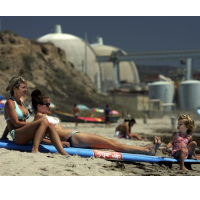Despite Billion-Dollar Budget, Nuclear Regulatory Commission Cancels Project Studying Cancer near Nuclear Facilities
 San Onofre Nuclear Power Generating Station (photo: Orange County Register)
San Onofre Nuclear Power Generating Station (photo: Orange County Register)
A five-year federal pilot program to determine levels of contamination around eight other nuclear facilities in the United States was cancelled this week because, apparently, the U.S. Nuclear Regulatory Commission (NRC) is already doing such a fine job of oversight.
“The NRC continues to find U.S. nuclear power plants comply with strict requirements that limit radiation releases from routine operations,” agency spokesman Scott Burnell wrote in defense of the decision. “The NRC and state agencies regularly analyze environmental samples from near the plants. These analyses show the releases, when they occur, are too small to cause observable increases in cancer risk near the facilities.”
There is nothing to see, so why waste the time and money. “The NRC determined that continuing the work was impractical, given the significant amount of time and resources needed and the agency’s current budget constraints.”
The cost was $8 million, $1.5 million of which has already been spent. The NRC has a budget of more than $1 billion. Results from the testing were not expected until at least the end of the decade. The study, led by National Academy of Sciences (NAS) researchers, was meant to update a 1990 National Cancer Institute (NCI) report that focused on cancer mortality, with limited occurrence of the disease in two states.
The NRC decided in 2007 to update the report and contacted the NAS to commence a two-phase study of cancer risks in populations living near NRC-licensed facilities. Phase 1 was to determine if doing the study was feasible. The conclusion reached in 2012 was “Yes.”
Phase 2 was to be broken into two parts: planning and execution. The commission killed it on Tuesday. Nuclear sites to be studied included active and decommissioned plants in California, Connecticut, Illinois, Michigan and New Jersey. A nuclear fuel fabrication plant in Tennessee was also on the list.
Supporters of the program are not happy. “Study after study in Europe has shown a clear rise in childhood leukemia around operating nuclear power facilities, yet the NRC has decided to hide this vital information from the American public,” said Cindy Folkers, radiation and health specialist at Beyond Nuclear.
Folkers blamed nuclear industry manipulation. Beyond Nuclear points to the NRC staff recommendation (pdf) that the commission drop the program. The policy issue document mentions a cheaper, crummier project pitched by the president of the U.S. National Council on Radiation Protection and Measurements (NCRP), but the staff concludes that no study is worth doing.
U.S. Senator Edward Markey (D-Massachusetts), who pushed for the cancer study in 2009, also did not sound happy. He said,
“We need a thorough, accurate accounting of the health risks associated with living near nuclear facilities so residents can know if there are any adverse health impacts. But the NRC has decided to take a ‘Don’t Ask, Don’t Tell’ approach to this public health concern by ceasing work on what could be a lifesaving cancer risk research study.”
-Ken Broder
To Learn More:
Cancer Risk Study Canceled at San Onofre (by Morgan Lee, San Diego Union-Tribune)
Regulators Halt Study of Cancer Risks at 7 Nuclear Plants (by Stephen Singer, Associated Press)
NRC Pulls Plug on Cancer Study near Nuclear Plants (by Christine Legere, Cape Cod Times)
Memo on Analysis of Cancer Risks in Populations near Nuclear Facilities Study (Nuclear Regulatory Commission staff) (pdf)
- Top Stories
- Unusual News
- Where is the Money Going?
- Controversies
- U.S. and the World
- Appointments and Resignations
- Latest News
- Trump Renames National Football League National Trump League
- Trump to Stop Deportations If…
- Trump Denounces World Series
- What If China Invaded the United States?
- Donald Trump Has a Mental Health Problem and It Has a Name






Comments